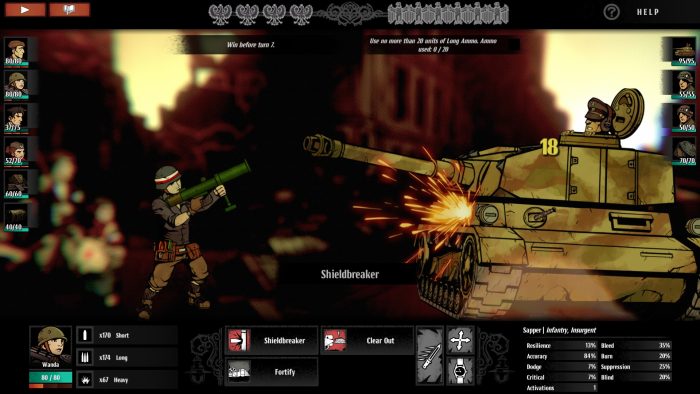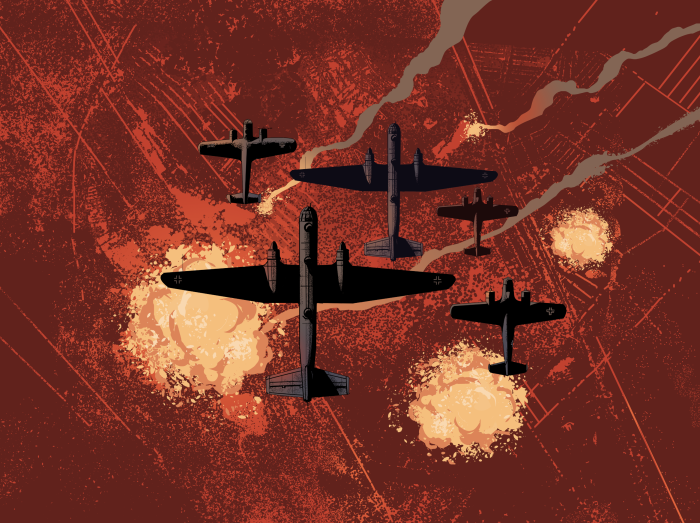The Warsaw Uprising after 80 years: what do commanders’ orders and appeals tell us?
“Warsaw Rising” is more than just a strategic game featuring characters stylized as insurgents and their opponents, with scenes from the Warsaw Uprising set against a comic book-style backdrop. What makes this project truly unique is that even if the player demonstrates exceptional skills and reflexes, completing all missions, the game will inevitably end in the Uprising’s defeat. Unlike other popular war games set during World War II, the story of fighting Warsaw remains true to historical accuracy. This means that, in the face of the overwhelming enemy advantage, despite the unparalleled heroism and determination of the insurgents, the game must end in their capitulation. This gives players a unique opportunity to immerse themselves in this dark, yet hopeful story.
The reality of war shown in a game
Players are never disconnected from the wartime reality of Warsaw in 1944. It is this very feature that distinguishes “Warsaw Rising” from many other games. From the very first moments of the game, we feel the weight of responsibility that has fallen upon us. We take on the role of a commander of a group of insurgents on whose shoulders rest not only their own lives but also the fate of the entire uprising. We choose our companions in arms, considering their individual skills. We have an impact on what ammunition resources we will have at our disposal as we traverse the streets of Warsaw. Each day brings new events described in detail in the calendar, showing how the area of the city covered by the Uprising is shrinking, how the population and insurgents on the liberated patch of independent Poland are dwindling.
The process of systematically approaching the inevitable end is inscribed in the attached and available during the game appeals and orders of the command of the insurgent units and the legitimate Polish authorities. Reading them intensifies and authenticates the sense of helplessness and loneliness of those fighting, who not only have to deal with encountering patrols of more numerous and better-armed German soldiers, but also cannot count on real support, due to the passive attitude of the Soviets and the indifference of the Allies.
“Warsaw Rising” tells the story of the Uprising, which was the most important event in the political, military and social dimension in Polish lands occupied by Germany in the years 1939-1944, the largest battle fought by partisan units, in the final phase of the fighting recognized as a full-fledged Allied army and the largest urban uprising in World War II. Considering the rank and far-reaching consequences of the Uprising, it is important to understand the genesis and conditions accompanying the decision of the Polish legal authorities to start the fight for the capture of Warsaw. It is generally believed that the uprising was in the military sense directed against the Germans, and politically against the Soviet Union.
It must be taken into account that, on the one hand, the structures of the Polish Underground State functioned after 1941 in Polish territories entirely occupied by Germany, opposed the occupier’s terror, organized the patriotic part of society to work for the legal Government of the Republic of Poland, on the other hand, from January 1944, the territories of the pre-war Polish state were gradually occupied by Soviet troops and the problem of unregulated Polish-Soviet relations became increasingly acute. Formally, the Soviet Union remained in an alliance with the Allies, primarily Great Britain and the United States, while, from 25 April 1943, Poland did not maintain diplomatic relations with the Soviet Union, as a result of which the new Soviet authorities on Polish territories taken over from the Germans did not recognize the sovereignty of the legal Polish Government.

The emotional conditions of the Warsaw Uprising
In this situation, the command of the Home Army, in agreement with the Delegate of the Government for the Country, decided to start the fight to take control of Warsaw. It was hoped that the armed effort and sacrifice of the insurgents demonstrated in the capital of occupied Poland would influence the policy of the Western Allies, as well as the attitude of the Soviets. For Poles, especially for the inhabitants of Warsaw, the great political game was not as important as the desire to react to five years of suffering and humiliation caused by the German occupation. These moods are expressed in the first words of the appeal of the insurgent authorities of 1 August addressed to the civilian population:
“Poles! The long-awaited hour has struck. Home Army units are fighting the German invader in all points of the Capital District.”
What mattered most was the fact of taking up the fight against the occupier, the possibility of being free “at home”, throwing off the yoke of foreign power. Already during the first mission of “Warsaw Rising”, like real insurgents, we participate in tasks leading to the capture of the buildings of the Main Post Office and the Prudential, we capture German tanks, or free hostages from the hands of German units. On 9 August 1944, the commander of the Home Army, in agreement with the Delegate of the Government for the Country, made a bold decision to ignite an uprising in Warsaw. Inspired by a vision of a free, independent, and socially just Poland, he sought to rally the insurgents to fight for their capital city.
An Uprising doomed to fail: the Uprising timeline
Despite the initial enthusiasm and sacrifices, the Warsaw Uprising was destined to fail. While the Uprising’s early days saw the insurgents make significant advances, capturing key districts like Śródmieście, Old City, Wola, Powiśle, parts of Ochota, Mokotów, and Żoliborz, even in these occupied areas, German forces-maintained strongholds. The insurgents’ enthusiasm and dedication proved insufficient to compensate for the lack of adequate weaponry, ammunition, and enough well-trained fighters.
The German response to the Uprising was swift and brutal. They systematically retook the captured districts, committing horrific massacres against civilians, particularly in Wola. By the end of August, the insurgents had lost control of most of the city, and their situation became increasingly desperate.
As early as 5 August, German forces launched an offensive against Wola, where they committed mass atrocities against the civilian population. Following the capture of Wola and Ochota, the Germans struck Old City on 11 August, igniting some of the most intense and devastating battles of the entire Uprising. Despite the insurgents’ valiant defence, Old City eventually fell to the German onslaught. The insurgents evacuated the district through the sewers to Śródmieście and Żoliborz on 1 and 2 September. One by one, the insurgents’ redoubts fell. Powiśle, Czerniaków, and Mokotow were captured, further shrinking the territory under insurgent control. On September 14th, the Red Army finally entered Praga, the eastern district of Warsaw. An attempt by the communist 1st Polish Army to cross the Vistula River and join the Uprising ended in failure, incurring significant losses.
On 15 August, three leaders of the Polish Underground: the Delegate of the Government for the Country, the Commander of the Home Army, and the Chairman of the Council of National Unity, informed the Warsaw population about their efforts to seek assistance from both the Western Allies and the Soviets. It is important to clarify here that the Allies’ policy towards Poland was conditioned by their paramount, from their perspective, relations with the Soviet Union. The benefits gained from the allied relationship with a power fighting Germany on the Eastern Front had a decisive impact on the Western Allies’ cautious stance towards Polish political demands. On the other hand, the Soviet Union sought not only to defeat Germany but also to occupy and subjugate the entire Central and Eastern European region. The Soviet authorities generally viewed the clandestine structures of the Polish state on Polish soil as an obstacle to achieving their own goals, although they were willing to make use of the combat support of Polish partisan units in the fight against the Germans on a temporary basis.
Lonely fighters
Due to these factors, external aid for the Uprising failed to materialize. Even when drops were made, or (in September) an attempt was made to land troops from Praga, the aid was merely symbolic. As General Kazimierz Sosnkowski, the Supreme Commander, eloquently stated in Order No. 19 issued on 1 September:
“For a month now, the Home Army fighters, together with the people of Warsaw, have been bleeding alone on the street barricades in relentless battles against an overwhelmingly superior enemy. (…) The people of Warsaw left to their own devices and abandoned on the front of the common fight against the Germans – this is a tragic and monstrous riddle that we Poles cannot decipher against the backdrop of the Allies’ technical power on the threshold of the sixth year of the war.”
General Sosnkowski’s order was not disseminated to avoid undermining the will to fight and perseverance. Only after the Uprising ended, in the appeal “To the Polish Nation” dated 3 October, did the civilian authorities – the underground government and parliament – describe in bitter words the loneliness of those fighting in Warsaw:
“We did not receive effective help. (…) Due to the enormous numerical and technical superiority, the Germans captured one district after another that we had previously controlled, and our situation gradually became hopeless. That’s the truth. We were treated worse than Hitler’s allies: Italy, Romania, Finland. So, we fought alone for nine weeks. We fought amidst the ruins of Warsaw, amidst the debris of everything we love, everything that is a memory of our centuries-old past. (…) The Warsaw Uprising in August collapsed due to the lack of effective assistance at the very moment when our army was helping to liberate France, Belgium, and the Netherlands. Today, we refrain from passing judgment on this tragic matter.”
Indeed, the Allied aviation provided insufficient assistance, making occasional drops under particularly difficult conditions due, among other things, to the Soviet authorities’ refusal to allow Allied planes to land in areas occupied by the Red Army. It’s worth mentioning that another IPN game, ‘Aviators – War in the Skies,’ reminds us of these events. In the ‘Warsaw’ mission, players have the opportunity to participate in a supply drop for the Warsaw insurgents. It’s a unique chance to look down on the burning city and see a digital replica of Warsaw from the time of the Uprising, with many characteristic landmarks such as Prudential, Napoleon Square, the Old Town, and the Royal Castle in Warsaw.

Controversies surrounding the Warsaw Uprising
From the very beginning of the Uprising, controversies arose in public debates regarding the decision to initiate the battle. This dispute continues to this day: The Uprising suffered immediate defeat both politically and militarily, and Warsaw was devastated. Reflecting on the rationale behind the decisions made is understandable given the tragic outcome. The Warsaw Uprising remains a symbol of heroism and the struggle for independence in the collective memory of the Polish nation. On the other hand, the spectacular demonstration of non-communist underground influence inspired Poles to continue resisting the forcibly imposed communist rule. The legend of the heroic struggle of the Insurgents remains vivid in the consciousness of many Poles, reinforcing patriotic sentiments and the determination to actively work for the common good. Something extraordinary happened in the minds of the Polish people during the Uprising, and this change offered hope for the future:
“The unity of soldiers, workers, peasants, and intellectuals, the brotherhood of the forest and the barricades in the fight against a common enemy, the remarkable maturity and determination of ordinary people—may it seal the internal cohesion and strength of our nation, essential for the overall consolidation of our political life. May it unite us for the future so that we can face the challenging tasks presented by the harsh reality. If such will be the outcome of the August battles in Warsaw, we can calmly contemplate Poland’s future.”
The authors of the aforementioned appeal “To the Polish Nation” of 3 October were not mistaken. The defeat of the Uprising, on the one hand, taught Poles political realism and made them painfully aware that they could rely on themselves alone, and on the other hand, united all strata and classes into one society for which the legend of the Uprising was a point of reference and a cohesive force. Thirty-six years after the overwhelming military and political defeat, in August 1980, all social strata were able to unite again in the nearly 10-million strong “Solidarity,” waging a peaceful struggle for subjectivity and independence.
“Warsaw Rising” is a game that fosters community building and strengthens patriotism among new generations of Poles. “Warsaw Rising” is not just entertainment, but an important educational and upbringing tool. It allows you to learn about history, develop values, and shape civic attitudes.
In 2024, we commemorate the 80th anniversary of the outbreak of the Warsaw Uprising. This event is of immense significance for Poland and Poles, a symbol of heroism, sacrifice, and the fight for freedom. The game “Warsaw Rising” gives us a unique chance to immerse ourselves in this history and experience it from the perspective of the insurgents. The IPN project can be used as educational material in history lessons or other extracurricular activities, providing an excellent starting point for discussions about the values of patriotism, courage, and responsibility. It can also inspire young people to further deepen their knowledge of Polish history and World War II. “Warsaw Rising” is not just a game – it is an immersive experience that allows you to better understand one of the most important events in Polish history. It is not an easy lesson, but one worth taking to heart. It is an important testament to the memory of the Warsaw Uprising and its heroes. By playing “WARSAW” on the 80th anniversary of the outbreak of the Uprising, we can honour the memory of the fallen and pay tribute to them.


